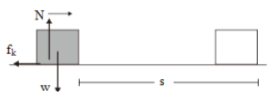Work-mechanical energy principle
The work-kinetic energy theorem states that the net work or the work done by the net force is equal to the change in kinetic energy.
Wnet = KEt – KEo = 1⁄2 m(vt2 – vo2)
Wnet = There are two types of forces, namely conservative force, and non-conservative force. Thus, net work can be considered to be comprised of the work done by a conservative force and the work done by a non-conservative force.
Wc + Wnc = ΔKE
The work done by a conservative force is equal to the negative change in potential energy:
Wc= -ΔPE
– ΔPE + Wnc = ΔKE
Wnc = ΔPE + ΔKE
Wnc = ΔME
The equation above states that the work done by a non-conservative force on an object is equal to the change in the mechanical energy of the object. Mechanical energy = potential energy + kinetic energy. Potential energy can take the form of gravitational potential energy or elastic potential energy.
Example question: The work-mechanical energy theorem
A 2 kg box initially moves at a speed of 10 m/s. Shortly after, the box stops. The coefficient of kinetic friction between the box and the floor is 0.2. The gravitational acceleration is 10 m/s2. How much is the box’s displacement?
Discussion:
Identified: m = 2 kg, vo = 10 m/s, vt = 0, k = 0.2, w = m g = (1 kg)(10 m/s2) = 10 kg m/s2 = 10 Newton,
Asked: the amount of the box’s displacement (s)
The work-mechanical energy theorem:
Wnc = ΔME
Wnc = ΔPE + ΔKE
The height (h) remains constant or there is no change in the height, so there is no change in the gravitational potential energy.
Wnc = ΔKE
The work done by the kinetic frictional force is:
Wnc = – fk s = μk N -s = μk w -s = μk m g -s
Wnc = – (0.2)(2)(10)(s) = – (4)(s)
The kinetic frictional force does negative work (the kinetic frictional force is in opposite direction from the object’s displacement)
Change in the kinetic energy:
ΔKE = 1⁄2 m (vt2 – vo2) = 1⁄2 (2)(02 – 102) = (0 – 100) = – 100
Object’s displacement:
Wnc = ΔKE
– (4)(s) = – 100
s = – 100 / – 4 = 25 meters
20 conceptual questions and answers about the work-mechanical energy principle:
1. Question: What is the work-mechanical energy principle? Answer: The work-mechanical energy principle states that the work done on an object is equal to the change in its mechanical energy.
2. Question: How is work defined in physics? Answer: Work is defined as the product of the force applied to an object and the distance it moves in the direction of the force
3. Question: What constitutes mechanical energy? Answer: Mechanical energy consists of an object’s kinetic energy and potential energy.
4. Question: In the absence of non-conservative forces, what can be said about the total mechanical energy of a closed system? Answer: The total mechanical energy remains constant.
5. Question: Give an example of a conservative force. Answer: Gravitational force is an example of a conservative force.
6. Question: How is potential energy different from kinetic energy? Answer: Potential energy is the energy due to position, like height above the ground, while kinetic energy is due to motion.
7. Question: How does the work done by a conservative force relate to potential energy? Answer: The work done by a conservative force is equal to the negative change in potential energy.
9. Question: How does the work-mechanical energy principle explain the conversion of potential energy to kinetic energy in a free-falling object? Answer: As an object falls, its potential energy decreases and its kinetic energy increases by an equivalent amount, keeping the total mechanical energy constant.
10. Question: What happens to the mechanical energy of a system when non-conservative forces, like friction, act on it? Answer: The mechanical energy decreases because non-conservative forces dissipate energy, often as heat.
11. Question: Can the mechanical energy of a system increase? Answer: Yes, when external work is done on the system.
12. Question: How is the concept of work related to energy? Answer: Work is the means by which energy is transferred or transformed in a system.
13. Question: If an object is moving at a constant velocity, what can be said about the net work done on it? Answer: The net work done on it is zero because no acceleration is happening.
15. Question: Why does a compressed spring have potential energy? Answer: When a spring is compressed, work is done on it, which is stored as potential energy. This energy can be released when the spring is let go.
16. Question: What is the work-energy theorem? Answer: The work-energy theorem states that the work done on an object is equal to the change in its kinetic energy.
17. Question: How is power related to work? Answer: Power is the rate at which work is done or energy is transferred. It’s calculated as , where is work and is time.
18. Question: Can work have a negative value? Answer: Yes, work is negative when the force and the direction of motion are opposite.
19. Question: If the angle between the force and the direction of motion is 90 degrees, what is the work done? Answer: The work done is zero because the force has no component in the direction of motion.
20. Question: How does a simple machine, like a lever, make work easier? Answer: A lever doesn’t change the total work done but changes the way the force is applied, making the task more manageable or efficient.
The concept of work and the mechanical energy principle are fundamental in physics and provide a foundational understanding of how energy is transferred and transformed in various systems.
